Even when you eat enough, sleep plenty of hours, and recover well, sometimes you still need an extra boost to perform your best at the gym. You may find yourself in the supplement aisle looking for a pre-workout to help you shake off the training cobwebs and bust through a plateau.
The best pre-workouts contain a blend of ingredients that may give you more energy and focus, better blood flow, less fatigue, and lead to strength and muscle gain down the line. But what ingredients should you look for, in particular?
To help cut through the confusion, BarBend has teamed with GNC for this breakdown of the top ingredients you’ll want to look for (and why) when choosing your supplements. And right now, you can take advantage of GNC’s Buy 2, Get 1 Free offer to save big on protein, aminos, pre-workouts, vitamins, hydration, creatine, and more. The deal is only good through March 27, 2024, so act fast!
Editor’s Note: The content on BarBend is meant to be informative in nature, but it should not be taken as medical advice. When starting a new training regimen and/or diet, it is always a good idea to consult with a trusted medical professional. We are not a medical resource. The opinions and articles on this site are not intended for use as diagnosis, prevention, and/or treatment of health problems. They are not substitutes for consulting a qualified medical professional.
Whey Protein
When you train hard, you need plenty of protein for all fitness goals and general health. Whey protein, which comes from milk, is a popular supplement because it’s a quick way to get 20 to 30 grams of a high-quality, complete protein source.
Whey is high in all the essential amino acids your body needs to build muscle, and it’s available to be rapidly digested and absorbed after training. It’s high in leucine, the amino acid that works as a precursor for muscle protein synthesis, and in cysteine, an antioxidant that can increase glutathione. (1)
Over the years, multiple studies have shown that whey protein can help you build muscle, lose fat, and improve recovery when you train regularly. (2)
Whey protein concentrate is the most popular type, but there are two other options: hydrolyzed whey protein and whey protein isolate. Both of these muscle-building ingredients can be found in GNC’s Wheybolic protein powder, and you can get a closer look at their benefits below:
Hydrolyzed Whey Protein
Whey protein hydrolysate is the most refined form of whey; it is pre-digested and broken down into amino acids. It removes most fat, carbohydrates, and calories, giving you almost 95 percent pure protein.
Hydrolyzed whey protein is a popular option for people who are lactose intolerant, a condition where your body can’t break down and absorb nutrients from food sources that contain milk. Since the protein is already broken down into smaller chains of amino acids called peptides — which may help the body with absorption compared to other types — it gets more rapidly absorbed.
Research suggests hydrolyzed whey protein is equally effective as regular whey at building muscle, improving recovery, and boosting fat loss when paired with resistance training. In particular, it may help speed leucine transport to stimulate muscle protein synthesis. (3)(4)
Whey Protein Isolate
Whey protein isolate is also refined to remove most of its fat, carbohydrates, and lactose — though it’s not pre-digested, like hydrolyzed whey. It still may be easier on the stomach for those who have issues with lactose. Whey isolate contains 90 percent protein and tends to be lower in calories than whey concentrate. It’s a great option for people looking to increase their protein intake without adding more calories.
Research shows whey protein isolate can help build muscle mass without adding on fat when paired with resistance training. (5)
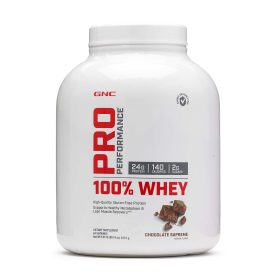
GNC Pro Performance® 100% Whey protein powder helps you achieve maximum wellness and athletic performance by supporting a healthy metabolism and lean muscle.
Creatine Monohydrate
Creatine is an amino acid naturally occurring in your body, mainly stored in your muscles and brain. Taking it as a supplement stores it as creatine phosphate in your muscle cells, a type of phosphagen. More stored phosphagens increase energy production, particularly ATP (adenosine triphosphate). ATP is your energy source for short-duration, high-intensity exercise like sprinting, weightlifting, and HIIT workouts.
Your body naturally creates ATP, but it burns out after a few seconds. Stored creatine helps it replenish quicker, so you can put in a few more quality reps before fatiguing. It can also give you better muscular contractions. (6)
The International Society of Sports Nutrition (ISSN) states that 50 years of research and hundreds of studies suggest creatine monohydrate is a safe supplement that helps build muscle, increase strength over time, and improve athletic performance. Emerging research suggests it also plays a role in brain health.
Creatine monohydrate is among the most widely studied supplements. That’s why it’s so important that your creatine supplements don’t have many—if any—additional ingredients standing in the way. This is true in GNC’s Pro Performance Creatine Monohydrate supplement, which touts 5 g of creatine monohydrate in every serving.
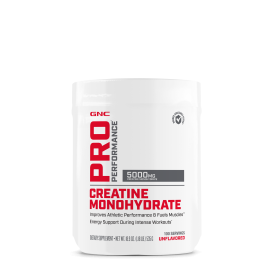
GNC Pro Performance® Creatine Monohydrate is manufactured to ensure purity, potency, and freshness—and it’s unflavored, so it blends easily with water or your favorite sports drink.
Pre-Workout and Vitamins
Want a quick boost before leg day? Here’s what to look for in your pre-workout supplements and vitamins to help you maintain high energy levels from your warmups through your cooldowns.
Caffeine
Stim and non-stim are two categories of pre-workout supplements, indicating whether or not they contain stimulants. If you opt for a stim pre-workout, it likely has caffeine. Caffeine stimulates your central nervous system and blocks adenosine binding, which can reduce fatigue and help you feel more alert and focused. (7)
There are a lot of studies out there on how caffeine impacts exercise performance. It may boost your energy, increase time to fatigue, and pack some cognitive benefits by improving your reaction time. Caffeine helps endurance exercise, and it may also help resistance training by reducing your rate of perceived exertion (RPE). (8)(9)(10)
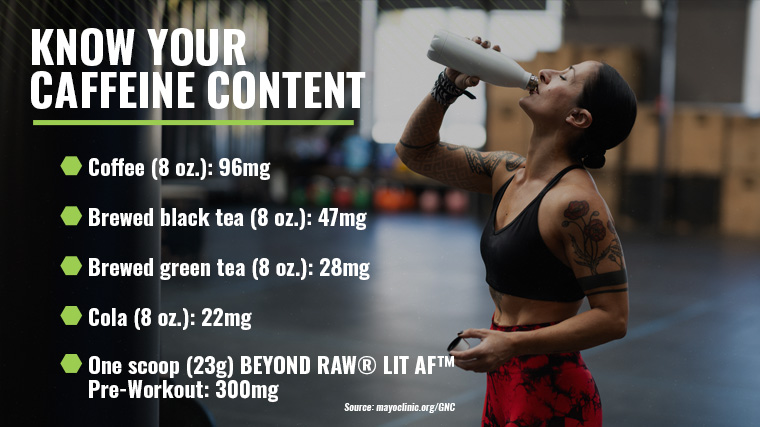
Caffeine is an essential ingredient in any pre-workout supplement, and it’s also one of the major players in GNC’s Mega Men® Sport Vitapak® Program, which is designed to promote energy levels and aid in recovery. This combination of essential vitamins and minerals contains over 30 clinically studied ingredients — including B vitamins and antioxidants — to support your performance every time you step into the gym.
Betaine Anhydrous
Betaine is a compound that may improve performance during power workouts. Anhydrous means “without water” and is usually found in powder form.
Research suggests that betaine anhydrous in pre-workout may increase power output and force while increasing muscular endurance and exercise capacity. It may also increase hypertrophy when paired with enough training stimulus, protein, and calories. (19)(20)(21)
A recent study on young men doing resistance training suggests that supplementing with betaine may increase upper- and lower-body muscular endurance. Participants were able to perform more reps in the bench press and leg press at a higher intensity. The ability to perform more high-quality reps in your sessions can increase your strength and build muscle over time. (22)
Betaine is naturally found in vegetables like beets and spinach. Look for beetroot juice or spinach extract in your pre-workout for a natural source of betaine. Beetroot and spinach are also dietary nitrates that increase nitric oxide. (23)
Beta-Alanine
The downside of caffeine and stim pre-workouts is that taking them too close to bedtime can make it difficult to fall asleep. Too much caffeine can also cause a jittery feeling, restlessness, and irritability. If you like to train in the evenings and want a non-stim pre-workout, look for beta-alanine as an ingredient.
Beta-alanine is a precursor to carnosine; both are amino acids. Higher levels of beta-alanine and carnosine can enhance intramuscular buffering, which refers to clearing your cells as they build up with lactic acid while you exercise. Research shows that this process may reduce feelings of fatigue, allowing you to train longer. (24)(25)
Studies suggest that including beta-alanine in your pre-workout improves exercise performance in short-duration activities lasting one to four minutes. It also seems to reduce fatigue more in older adults. (26)
This is a prime ingredient to look for in your pre-workouts, and one of the products it’s found in is BEYOND RAW® LIT AF™ pre-workout. This powerful supp has 3.2 g of beta-alanine in every serving. Additionally, it also sports 300 mg of caffeine, 2 g of creatine monohydrate, and 8 g of L-citrulline.
L-Citrulline
L-citrulline is a non-essential amino acid. It’s a precursor for L-arginine, and both (along with nitrates) stimulate nitric oxide production.
Nitric oxide is a natural gas in your body that relaxes and widens your blood vessels, allowing for better blood flow (or vasodilation). More blood flow during exercise delivers more oxygen and nutrients to your muscles, which can improve your performance as an athlete. (13)
More blood flow during strength training also gives you a better pump, which is more than just aesthetics. It can deliver more nutrients to your muscles when paired with proper nutrition. (13)
Research suggests that nitric oxide boosters, like L-citrulline, in your pre-workout may improve performance in aerobic exercise. It may increase endurance in long-duration cardio workouts like running and cycling. (14)(15)
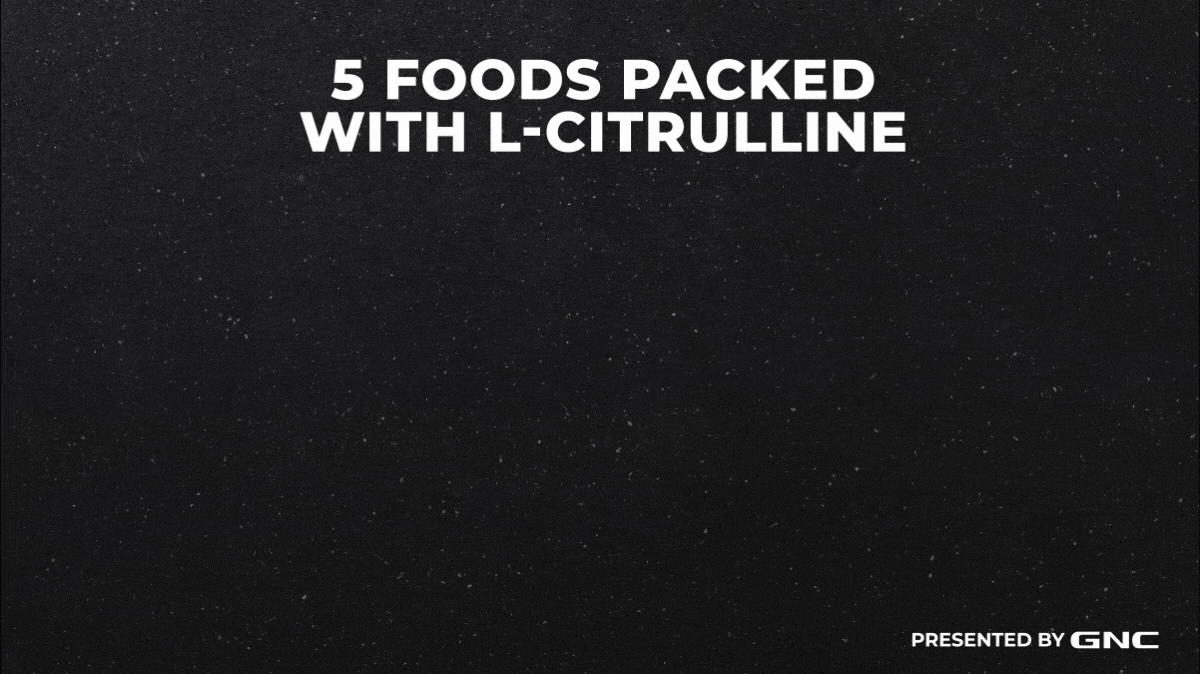
Some studies also show that nitric oxide may improve muscle recovery by speeding up lactic acid removal from your blood and muscles after training. A systematic review found that athletes supplementing with three to four grams of L-citrulline or eight grams of citrulline malate one hour before training had reduced muscle soreness and RPE after exercise. (16)(17)
If you like natural ingredients, look for watermelon juice or extract. Watermelon is a great natural source of citrulline. (18)
L-Carnitine
L-carnitine is an amino acid that moves fatty acids to your cells to use as an energy source. It is often advertised as a fat burner since it plays a role in energy metabolism. L-carnitine also may increase oxygen consumption, which can improve endurance and contribute to fat burning. (27)(28)
Research suggests L-carnitine can help improve energy during anaerobic exercises, like weightlifting, sprinting, HIIT workouts, or other short-duration, high-intensity activities. (29)(30)
Recent studies indicate that L-carnitine may help more with exercise recovery by improving oxygen uptake and reducing muscle damage from high-intensity training. It may also reduce fatigue and muscle soreness after exercise. (31)
B Vitamins
Many pre-workout supplements contain B vitamins, which usually include a range of vitamins, most notably B6 and B12. These vitamins play a role in energy production and metabolism. (32)(33)
Vitamin B-12 is only found in animal-based foods, so you may not get enough of it if you’re a vegetarian or vegan. Research shows that people over 50 absorb less vitamin B12 as they age, so older athletes may also benefit from B vitamins in a pre-workout. (34)
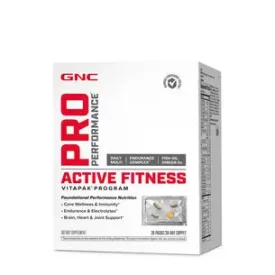
GNC Pro Performance® Active Fitness Vitapak® Program combines the best immune health benefits of a daily multivitamin with an Omega-3 supplement and an endurance supplement.
Powering Up
Selecting the right workouts is only half the battle when it comes to keeping fit — you also need to make sure your nutrition is helping you to maximize your training. The good news is that you can find high-quality supplements during GNC’s limited-time Buy 2, Get 1 Free offer.
From pre-workouts that energize your workouts to whey protein supplements that aid in recovery afterward, the supplements at GNC are geared to take your gains to the next level. Head here for more.
References
- Hoffman JR, Falvo MJ. Protein – Which is Best? J Sports Sci Med. 2004 Sep 1;3(3):118-30.
- Hulmi JJ, Lockwood CM, Stout JR. Effect of protein/essential amino acids and resistance training on skeletal muscle hypertrophy: A case for whey protein. Nutr Metab (Lond). 2010 Jun 17;7:51.
- Moro T, Brightwell CR, Velarde B, Fry CS, Nakayama K, Sanbongi C, Volpi E, Rasmussen BB. Whey Protein Hydrolysate Increases Amino Acid Uptake, mTORC1 Signaling, and Protein Synthesis in Skeletal Muscle of Healthy Young Men in a Randomized Crossover Trial. J Nutr. 2019 Jul 1;149(7):1149-1158.
- Brown MA, Stevenson EJ, Howatson G. Whey protein hydrolysate supplementation accelerates recovery from exercise-induced muscle damage in females. Appl Physiol Nutr Metab. 2018 Apr;43(4):324-330.
- Duarte NM, Cruz AL, Silva DC, Cruz GM. Intake of whey isolate supplement and muscle mass gains in young healthy adults when combined with resistance training: a blinded randomized clinical trial (pilot study). J Sports Med Phys Fitness. 2020 Jan;60(1):75-84.
- Kreider RB, Kalman DS, Antonio J, Ziegenfuss TN, Wildman R, Collins R, Candow DG, Kleiner SM, Almada AL, Lopez HL. International Society of Sports Nutrition position stand: safety and efficacy of creatine supplementation in exercise, sport, and medicine. J Int Soc Sports Nutr. 2017 Jun 13;14:18.
- Institute of Medicine (US) Committee on Military Nutrition Research. Caffeine for the Sustainment of Mental Task Performance: Formulations for Military Operations. Washington (DC): National Academies Press (US); 2001. 2, Pharmacology of Caffeine.
- Pickering C, Grgic J. Caffeine and Exercise: What Next? Sports Med. 2019 Jul;49(7):1007-1030.
- Southward K, Rutherfurd-Markwick KJ, Ali A. The Effect of Acute Caffeine Ingestion on Endurance Performance: A Systematic Review and Meta-Analysis. Sports Med. 2018 Aug;48(8):1913-1928.
- Grgic, J., Mikulic, P., Schoenfeld, B.J. et al. The Influence of Caffeine Supplementation on Resistance Exercise: A Review. Sports Med 49, 17–30 (2019).
- Hurley, Caitlin F.; Hatfield, Disa L.; Riebe, Deborah A.. The Effect of Caffeine Ingestion on Delayed Onset Muscle Soreness. Journal of Strength and Conditioning Research 27(11):p 3101-3109, November 2013.
- Gonzalez AM, Townsend JR, Pinzone AG, Hoffman JR. Supplementation with Nitric Oxide Precursors for Strength Performance: A Review of the Current Literature. Nutrients. 2023 Jan 28;15(3):660.
- Gonzalez, Adam M.1; Trexler, Eric T.2. Effects of Citrulline Supplementation on Exercise Performance in Humans: A Review of the Current Literature. Journal of Strength and Conditioning Research 34(5):p 1480-1495, May 2020.
- Gough LA, Sparks SA, McNaughton LR, Higgins MF, Newbury JW, Trexler E, Faghy MA, Bridge CA. A critical review of citrulline malate supplementation and exercise performance. Eur J Appl Physiol. 2021 Dec;121(12):3283-3295.
- Mor A, Yılmaz AK, Acar K, Birinci MC, Ipekoglu G. Does Nitric Oxide Intake Affect Post-Exercise Recovery in Athletes? A Study on Cocoa, Caffeine and Nitric Oxide Supplement: Effect of Nitric Oxide Intake in Athletes. Progr Nutr [Internet]. 2020 Sep. 30
- Rhim HC, Kim SJ, Park J, Jang KM. Effect of citrulline on post-exercise rating of perceived exertion, muscle soreness, and blood lactate levels: A systematic review and meta-analysis. J Sport Health Sci. 2020 Dec;9(6):553-561.
- Volino-Souza M, Oliveira GV, Conte-Junior CA, Figueroa A, Alvares TS. Current Evidence of Watermelon (Citrullus lanatus) Ingestion on Vascular Health: A Food Science and Technology Perspective. Nutrients. 2022 Jul 15;14(14):2913.
- Lee EC, Maresh CM, Kraemer WJ, Yamamoto LM, Hatfield DL, Bailey BL, Armstrong LE, Volek JS, McDermott BP, Craig SA. Ergogenic effects of betaine supplementation on strength and power performance. J Int Soc Sports Nutr. 2010 Jul 19;7:27.
- Hoffman JR, Ratamess NA, Kang J, Rashti SL, Faigenbaum AD. Effect of betaine supplementation on power performance and fatigue. J Int Soc Sports Nutr. 2009 Feb 27;6:7.
- Cholewa JM, Wyszczelska-Rokiel M, Glowacki R, Jakubowski H, Matthews T, Wood R, Craig SA, Paolone V. Effects of betaine on body composition, performance, and homocysteine thiolactone. J Int Soc Sports Nutr. 2013 Aug 22;10(1):39.
- Arazi H, Aboutalebi S, Taati B, Cholewa JM, Candow DG. Effects of short-term betaine supplementation on muscle endurance and indices of endocrine function following acute high-intensity resistance exercise in young athletes. J Int Soc Sports Nutr. 2022 Mar 22;19(1):1-16.
- Dos Santos Baião D, Vieira Teixeira da Silva D, Margaret Flosi Paschoalin V. A Narrative Review on Dietary Strategies to Provide Nitric Oxide as a Non-Drug Cardiovascular Disease Therapy: Beetroot Formulations-A Smart Nutritional Intervention. Foods. 2021 Apr 15;10(4):859.
- Hoffman JR, Emerson NS, Stout JR. β-Alanine supplementation. Curr Sports Med Rep. 2012 Jul-Aug;11(4):189-95.
- Harty PS, Zabriskie HA, Erickson JL, Molling PE, Kerksick CM, Jagim AR. Multi-ingredient pre-workout supplements, safety implications, and performance outcomes: a brief review. J Int Soc Sports Nutr. 2018 Aug 8;15(1):41.
- Trexler ET, Smith-Ryan AE, Stout JR, Hoffman JR, Wilborn CD, Sale C, Kreider RB, Jäger R, Earnest CP, Bannock L, Campbell B, Kalman D, Ziegenfuss TN, Antonio J. International society of sports nutrition position stand: Beta-Alanine. J Int Soc Sports Nutr. 2015 Jul 15;12:30.
- Virmani MA, Cirulli M. The Role of l-Carnitine in Mitochondria, Prevention of Metabolic Inflexibility and Disease Initiation. Int J Mol Sci. 2022 Feb 28;23(5):2717.
- Wall BT, Stephens FB, Constantin-Teodosiu D, Marimuthu K, Macdonald IA, Greenhaff PL. Chronic oral ingestion of L-carnitine and carbohydrate increases muscle carnitine content and alters muscle fuel metabolism during exercise in humans. J Physiol. 2011 Feb 15;589(Pt 4):963-73.
- Pooyandjoo, M., Nouhi, M., Shab-Bidar, S., Djafarian, K., & Olyaeemanesh, A. (2016). The effect of (L-)carnitine on weight loss in adults: A systematic review and meta-analysis of randomized controlled trials. Obesity Reviews, 17(10), 970-976.
- Karlic H, Lohninger A. Supplementation of L-carnitine in athletes: does it make sense? Nutrition. 2004 Jul-Aug;20(7-8):709-15.
- Pistone G, Marino A, Leotta C, Dell’Arte S, Finocchiaro G, Malaguarnera M. Levocarnitine administration in elderly subjects with rapid muscle fatigue: effect on body composition, lipid profile and fatigue. Drugs Aging. 2003;20(10):761-7.
- Stefan M, Sharp M, Gheith R, Lowery R, Ottinger C, Wilson J, Durkee S, Bellamine A. L-Carnitine Tartrate Supplementation for 5 Weeks Improves Exercise Recovery in Men and Women: A Randomized, Double-Blind, Placebo-Controlled Trial. Nutrients. 2021 Sep 28;13(10):3432.
- U.S. Department of Health and Human Services. Vitamin B6 – Fact Sheet for Health Professionals. National Institutes of Health.
- U.S. Department of Health and Human Services. Vitamin B12 – Fact Sheet for Health Professionals. National Institutes of Health.
- Allen, L. H. (2009). How common is vitamin B-12 deficiency? The American Journal of Clinical Nutrition, 89(2), 693S-696S.
